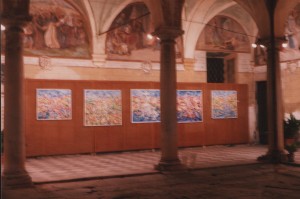 INDIVIDUAL
EXCESSES INDIVIDUAL
EXCESSES
Giuseppe Piovanelli
An artist should always show his personality, even his physical
aspect, simulating or interpreting a way of being.
Can this attitude play an important role with the observer?
Yes, it can. The artist can certainly exploit this role.
Here the artist’s culture is at stake and his personality is
highlighted: behaviour, dialectics, these aspects can justify his
work. Who can they favourably or badly influence?
Who is in charge of explaining or appreciating those frank,
sincere or false interpretations that are put into comparison?
Does an artist unwilling to expose himself, even physically, put
his works at risk of wrong interpretations and judgments?
It may happens that artists whose “propitiatory deities” don’t
meet with some people’s favour or nobody competent with the right
address are denied to enter History. What does all this mean?
Is it a poor culture that our critics or historians could
apparently make us believe? Is it really like that? The artist
builds his own culture that the critic and the historian must
understand.
The process of the artist’s appreciation is accomplished through
the critics and the historians. The artist only tells us about his
works and himself.
Ideas and concepts are useful to ripe and estimate knowledge, the
environment grows and is assimilated with culture: the artist
takes possession of it, he interprets it through intentionally
reshaped and highlighted expressions.
That makes the artist take part in History in his own environment.
This environment widens its dimensions and embraces other cultures
that compare the artist with a particular moment in time and with
the past.
All that rises the artist over judgements pros and cons, safe from
twisting formulas that, in any case, don’t influence the result of
his work always “free”.
The artist and his work will always exist.
10th June 1982
BE WELL
FOUNDED
Giuseppe Piovanelli
Every single figure doesn’t make sense outside its own scene.
The scene doesn’t make sense if uprooted from the reality of the
rock.
The rock doesn’t make sense outside its environment.
The environment is landscape where the man created the scene.
The creation of the scene was motivated by existential, emotional
and contextual factors that must not be ignored.
Did perhaps kitsch and free, improvised aestheticism exist also in
other past ages?
March 1983
|


